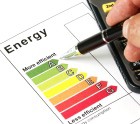EPCs don’t make the grade for true efficiency measurement

Experts are pointing out that Energy Performance Certificates (EPCs) are not a good indication of energy efficiency for buildings. The growing calls for other ways to indicate building energy use come as Minimum Energy Efficiency Standards (MEES) are introduced this month.
MEES effectively make it impossible to lease out a building that has an EPC rating lower than E. However, industry experts areincreasingly raising concerns that EPCs have very little indication of actual energy use and are only a theoretical figure.
Speaking at this year’s Ecobuild event, Dr Robert Cohen,director of Verco, said: “We are blind as to the efficiency of new commercial buildings. EPCs are a poor indicator of actual energy use. There is very little connection between an EPC and energyuse in real life. It’s not a good correlation.”
His comments reflect those or Dr Andrew Geens at last year’s MBS round table discussion on MEES: “It is very important to bear in mind that the EPC is not a prediction of running costs or long-term performance.”
However, finding an alternative to EPCs and MEES is challenging. The Better Buildings Partnership is currently exploring options and has pointed to a system used in Australia as a good example.
For more on these issues see News Analysis and our MEES features.








